Notification announcement
Elder-care potential in GBA?
Date:2022-10-09
By 2036, the elderly will comprise one-third of Hong Kong's population. We do not have sufficient elder-care homes or facilities to cope. The situation is critical. To leverage future retirement options in the GBA, it is vital to streamline cross-border administration, medical insurance, and electronic health records. William Xu reports from Shenzhen.

In its mid-2021 data, the Hong Kong Census and Statistics Department records 87,300 residents aged 65 and above relocated to Guangdong province. That is nearly 30 percent above the 2013 numbers, when the Social Welfare Department first extended cross-border availability of its Old Age Allowance and Old Age Living Allowance programs to resettled locals in Guangdong. In 2018, these allowances were extended to retirees in Fujian province.
Guangdong and Fujian are the top two choices for Hong Kong's elderly. By July, nearly 22,000 resettled Hong Kong elderly received allowances from the two programs. In November 2020, the Hong Kong Hospital Authority piloted a program for resettled patients to receive follow-up consultation, with access to their medical records, at the University of Hong Kong-Shenzhen Hospital. As of March, the follow-up consultation program was accessed by over 35,000 patients.
Since October 2015, eligible Hong Kong elderly can also use their annually renewed Elderly Health Care Vouchers worth HK$2,000 ($255) at HKU-SZH's facilities. For seniors pending a care home, the Hong Kong government subsidizes relocation to two residential care homes in Shenzhen and Zhaoqing, run separately by Hong Kong nongovernmental organizations.
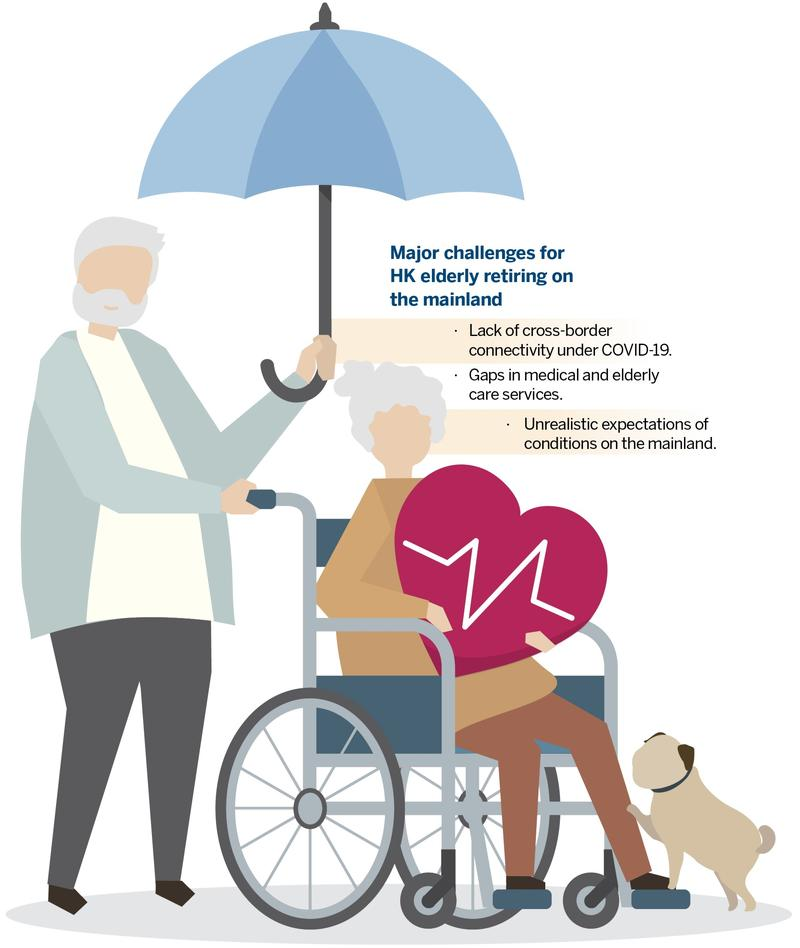
Macao community plan
Macao initiated an integrated community project in Hengqin, in the city of Zhuhai, called the Macao New Neighborhood, to be completed in 2023. The blueprint for the 190,000-square-meter site includes schools, healthcare stations, and elder-care centers, plus over 4,000 residential units, available exclusively to mainland-based Macao residents for purchase.
This replicates a Macao community inside the mainland, with a familiar administrative system and a common, shared neighborhood. It reduces the uncertainty and anxiety of resettlement for Macao residents. Schooling, health, and elder-care facilities complete the living ecosystem for families.
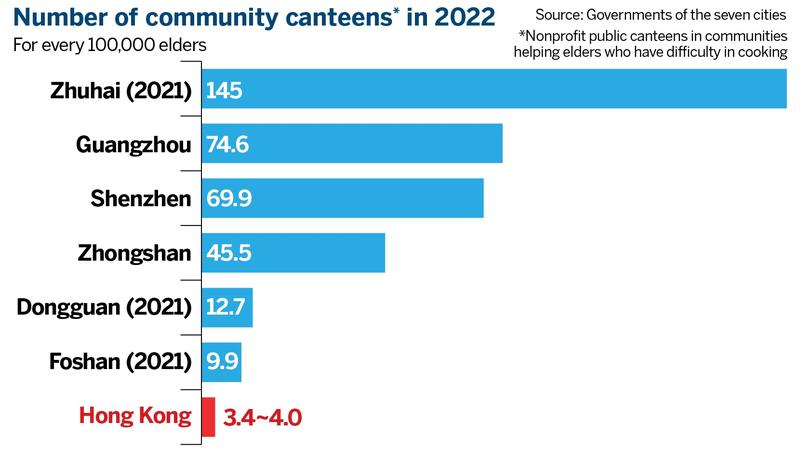
Familiar ecosystem
Helene Fung Hoi-Lam, chairperson of the Department of Psychology at the Chinese University of Hong Kong, found that besides medical care and social security, a familiar environment and community is the most important factor for retirees. Macao is a relevant model for Hong Kong to consider.
Mainland cities in the Greater Bay Area will be the preferred choice for proximity and cultural affinity to Hong Kong, Fung said. Many young people have worked and lived on the mainland, she added. If Hong Kong medical and social security systems are available, they can bring their parents to live with them, if not under the same roof, then at least in the same community.
The lack of information about living on the mainland, and the available support from Hong Kong and Guangdong authorities needs to be addressed, Fung said. The advantages, limitations, and development plan needs to be spelled out for the elderly and their families to decide with confidence.
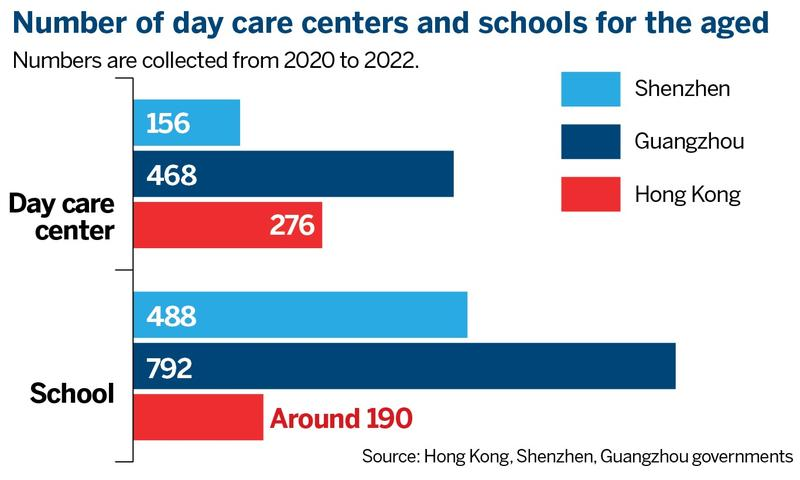
Mainland support
Mainland authorities have rolled out policies to facilitate Hong Kong people, including retirees, living on the mainland. Residents of Hong Kong, Macao and Taiwan with a mainland residence permit have been eligible for its social and medical insurance cover since January 2020. Hong Kong residents with basic medical insurance can pay the same fees as mainland residents, and enjoy the same benefits at local public hospitals.
Guangdong province launched the Bay Area Social Security Services for Hong Kong and Macao residents to apply via simplified procedures online. By August 2021, 238,000 Hong Kong and Macao residents were insured in Guangdong province.
Beyond social security insurance, care services and financial subsidies, mainland-based Hong Kong elders can participate in cultural and sports activities.
The Shenzhen government enabled 488 schools to provide hobby lessons to the elderly, for smart phone navigation, photography, and dance. These activities have helped people like Man Kam-chuen, a 93-year-old Hong Kong retiree who has resided in Shenzhen for three decades, enjoy a meaningful retirement and integrate into the local community. For example, Man enjoys gifting his calligraphy to friends at a weekly club, or meeting new people while playing table tennis and Chinese chess.

Involve private insurance
Terry Lum Yat-sang, professor in the Department of Social Work and Social Administration at the University of Hong Kong, suggested the special administrative region government calculate the average annual cost per person in medical care for mainland-based elderly, and allocate that amount to buy medical services from public hospitals in the Greater Bay Area, such as Zhongshan. That would allow Hong Kong retirees to be served medically where they live, instead of returning to Hong Kong.
Encouraging more Hong Kong elderly to join mainland's basic medical insurance will relieve their financial burden too. The Macao government offered an annual subsidy of 1,000 patacas ($124) to seniors aged 65 or above enrolled in basic medical insurance in Zhuhai, Zhongshan and Jiangmen. In August, the program was extended to other mainland cities in the Greater Bay Area.
Fung agreed that helping Hong Kong seniors get medical coverage on the mainland is useful in the short term. In addition, she suggested that Hong Kong government coordinate with private insurance companies for affordable comprehensive plans for mainland-based Hong Kong seniors.
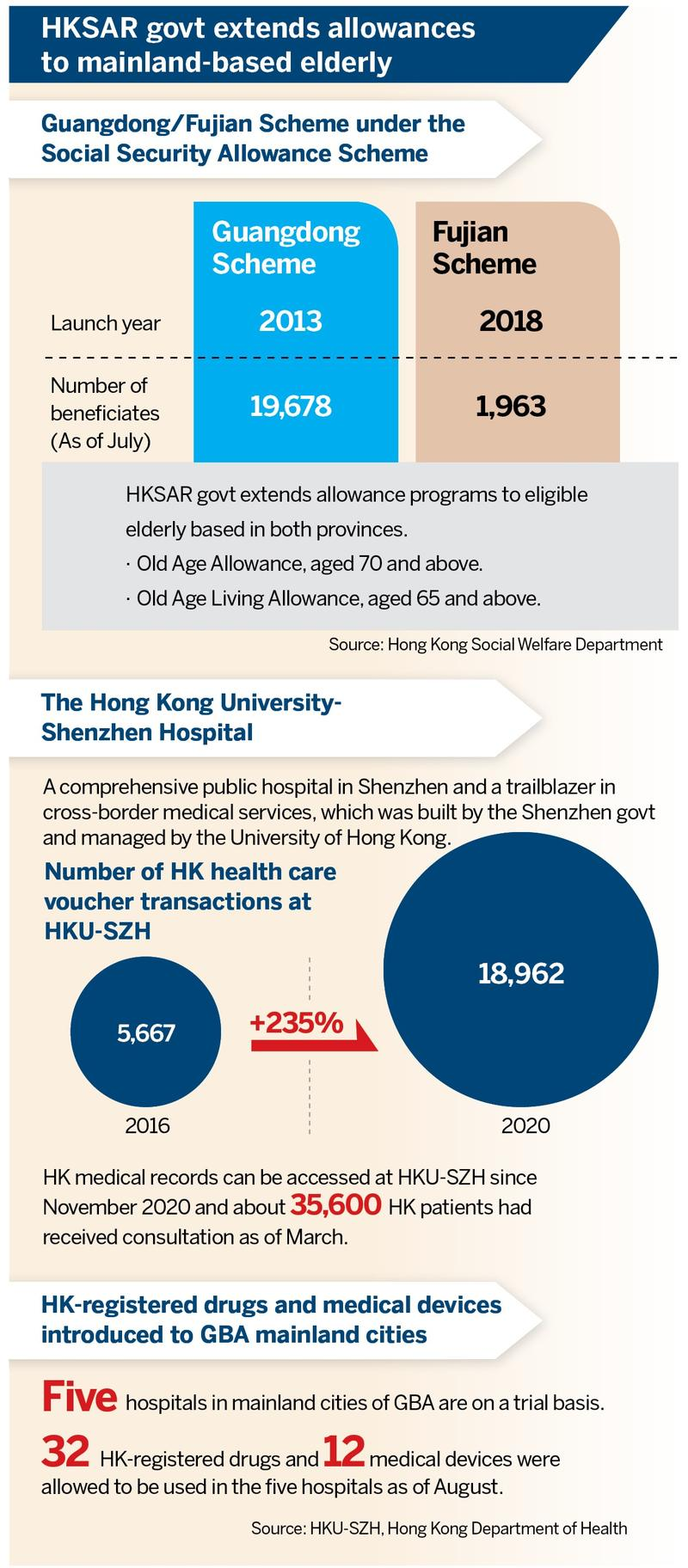
More GBA resources
The National Health Commission indicates about 90 percent of the mainland elderly live at home, while 7 percent have home care with community support. Shenzhen enacted its first legislation for senior care services in March 2021, initiating a long-term sustainable elder-care system integrating home care, community care, and institutional care.
The Shenzhen government has subsidized over 2,000 households for age-friendly home facilities. Emergency calling systems have been installed, with handrails and slip-resistant mats in bathrooms, where seniors are prone to fall.
In Futian district, a community uses a computer housekeeper system to connect the call center and elderly homes. With a call or voice message, seniors can get door-to-door food deliveries, home care services, and medical consultations from community facilities.
As of September, Shenzhen has 161 community elder-care centers for day care, home care, and basic medical consultation, according to the city's civil affairs bureau. The city aims eventually to offer basic elder-care services to homes in less than 15 minutes.
Guangzhou built 1,000 community canteens across the city for the elderly and those in need. For a few yuan, they get a hot meal at a canteen near their home. Door-to-door food delivery services are also available for those who cannot access the canteens.
Zhongshan is encouraging property management companies to provide elder-care services in their communities. In the city's Gangkou town, a property management company organizes regular home visits to the elderly, and helps them set up their personal health records. This was well-received by the residents, the local government said.
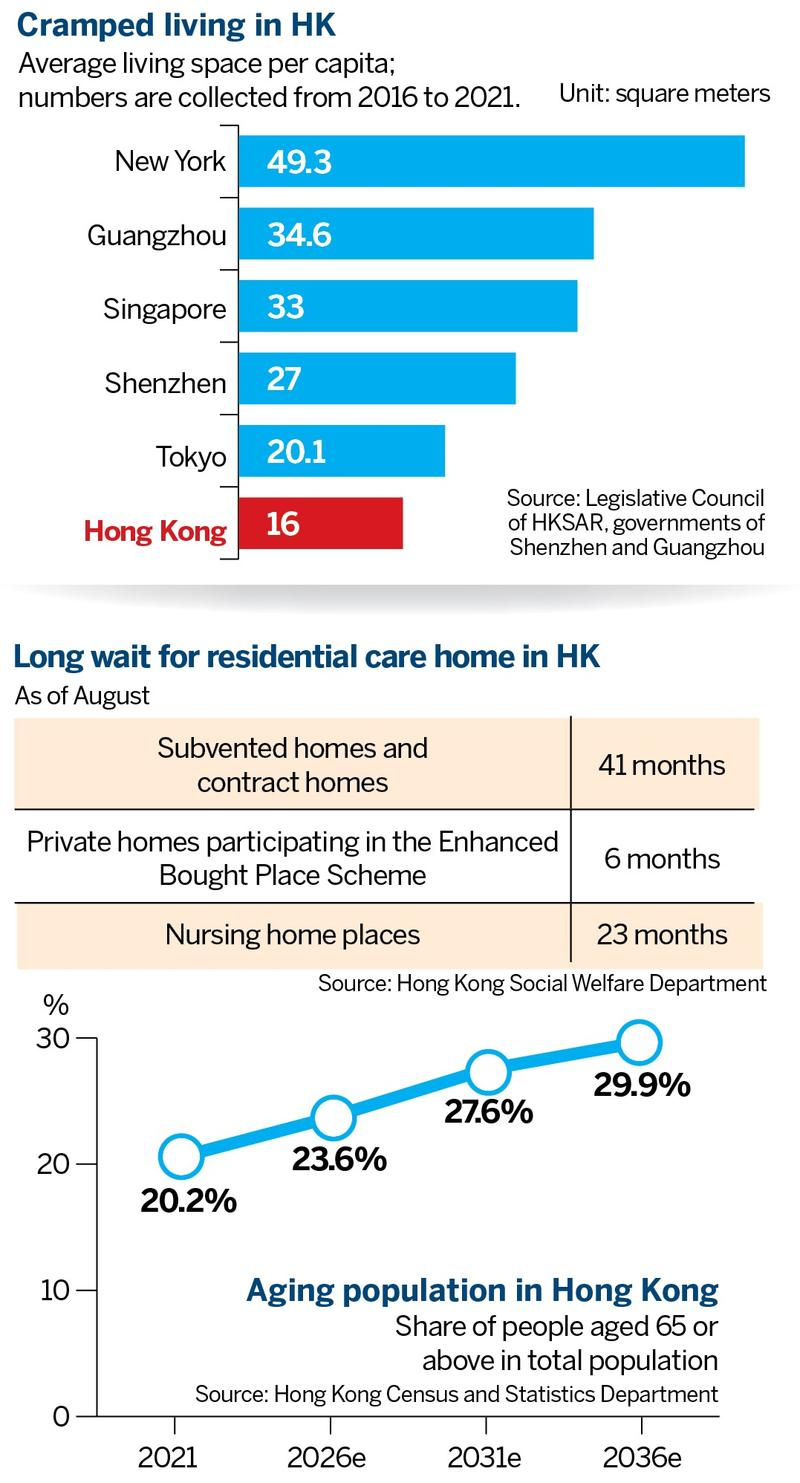 Covid disruption
Covid disruption
The COVID-19 pandemic disrupted cross-border movement. A retired Hong Kong teacher affected by the travel obstacles was Ko Shing-che, who lived in Shenzhen for 20 years. In 2020, the 77-year-old had emergency cardiac surgery at HKU-SZH. The operation and follow-up treatments cost him 170,000 yuan ($23,840) — much higher than a similar surgery at a public hospital in Hong Kong. He had no choice under the circumstances.
Before the pandemic, retirees like Ko preferred to see doctors in Hong Kong. The COVID-19 pandemic made cross-border travel nearly impossible. Accessing medical services on the mainland without local health insurance can be expensive.
Ko said the elderly medical voucher, which is renewed annually, can only contribute marginally. He still has to pay additional 7,000 to 8,000 yuan a year for follow-up treatment. He hopes HKU-SZH will allow Hong Kong residents to get medical treatment at SAR public health rates.
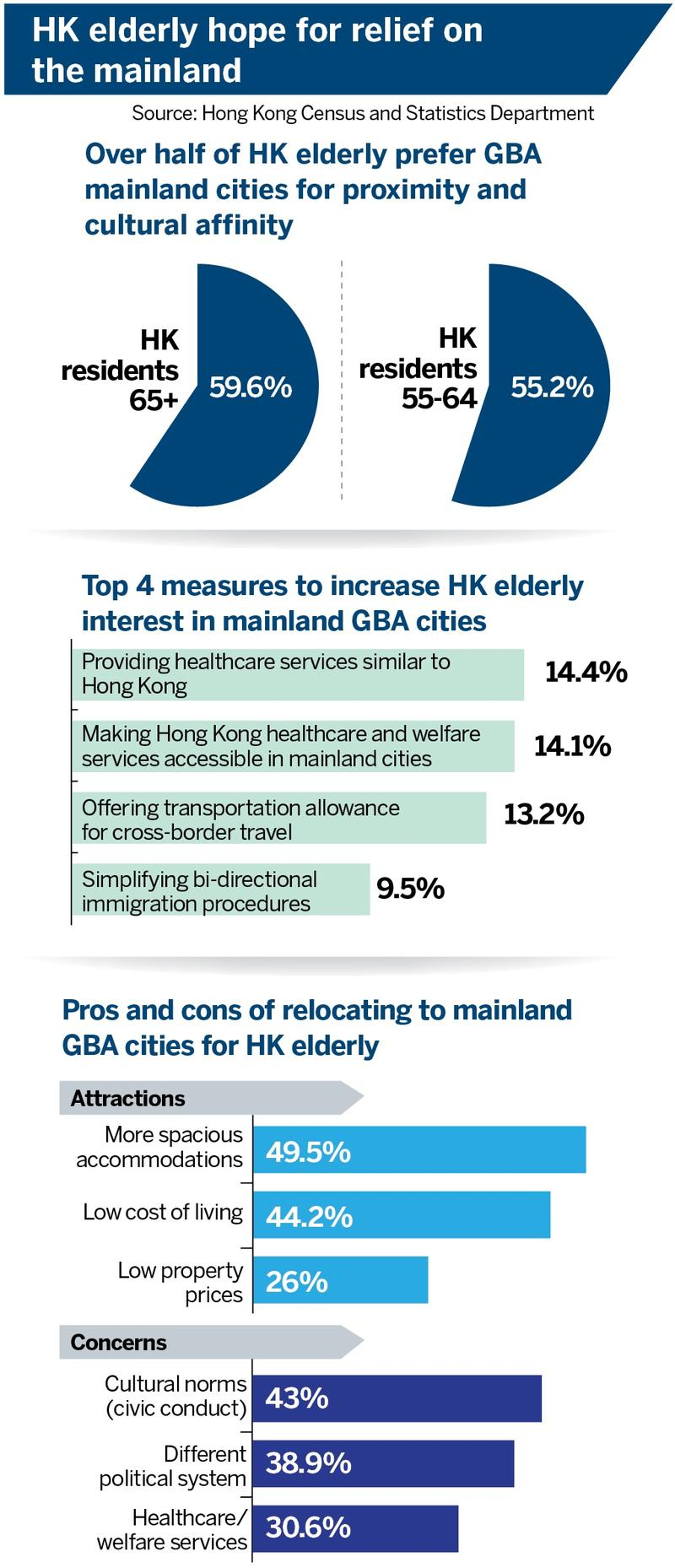
Emotional distress
The COVID-19 situation troubled care homes on the mainland. Mandy Lau Shuk-yin, senior manager of the International and China division at the Hong Kong Society for Rehabilitation, operates the Hong Kong Jockey Club Shenzhen Society for Rehabilitation at Yee Hong Heights, one of the two mainland care homes subsidized by the Hong Kong government.
Since early March, because of the recurrent COVID-19 outbreak, Yee Hong Heights, like all other care homes in the Shenzhen, enforced closed-loop management several times, denying family visits. The restrictions triggered emotional distress for some seniors, while others requested a transfer back to care homes in Hong Kong.
Lau hoped the cross-border travel restrictions can be lifted soon. She welcomed more NGOs to operate Hong Kong-type senior care services on the mainland for more retirees. But the SAR government should help streamline administrative procedures for NGOs to operate on the mainland, she added.
The "Overall Plan for Deepening Globally Oriented Comprehensive Co-operation amongst Guangdong, Hong Kong and Macao in Nansha of Guangzhou" was published in June. The plan selects Nanshan to align its social security architecture with Hong Kong's for an integrated medical treatment and elder-care ecosystem.
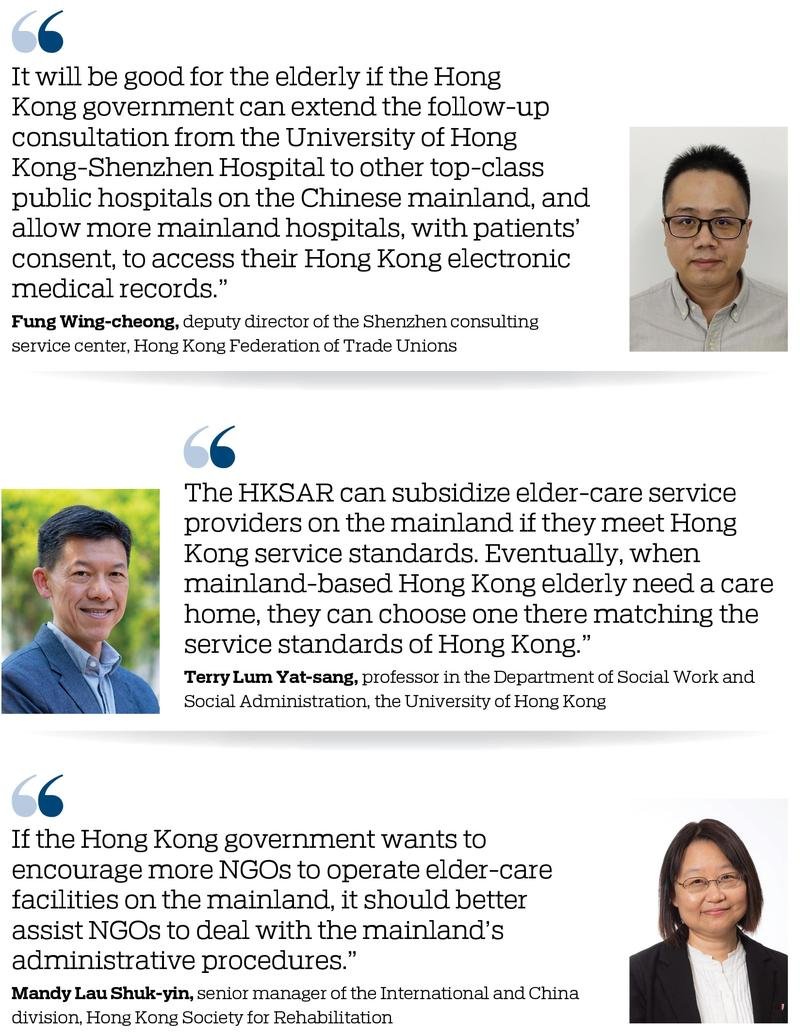
Stressed aging
The tight average living space per person of 16 square meters in Hong Kong is dismal, against 20.1 sq m for Tokyo, 30.7 sq m for Seoul and 33 sq m for Singapore, from a Legislative Council research paper.
Hong Kong seniors see the Guangdong-Hong Kong-Macao Greater Bay Area as an affordable retirement option. A Census and Statistics Department survey in 2019 estimated tens of thousands of retirees are keen to relocate to mainland GBA cities.
Quality of life in the retirement years of restricted space, reduced mobility, and impairment can have adverse consequences on mental health too. Demand for residential care homes grows unfulfilled, because of the SAR's high land cost and scarcity. The Social Welfare Bureau confirms for August, the waiting time for a care home stood at 20 to 23 months.
(Source: China Daily)

